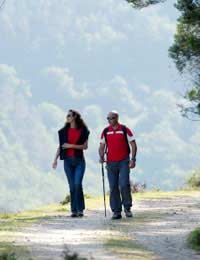Eco-Friendly Holiday Health

Being ill, away from home – even if only mildly – is never a pleasant experience; no holiday should turn into a consumer test of the local medical facilities! Whether you are venturing far from civilisation or staying in more familiar territory a few simple precautions should help you stay fit and well throughout your stay, while keeping the environmental impact of your holiday health to a minimum.
With travel health, the proverbial ounce of prevention is definitely worth that pound of cure, so before you set off on your trip find out about any vaccinations you may need and any particular health risks relevant to your destination. Your GP or Health Centre are a good starting point and many travel agents can often offer useful advice. For more specific information the Embassy or High Commission of the countries concerned can also be approached – exactly where you are going, at what time of year and how long you intend to stay may all make a difference to the precautions you need to take.
Bites and Stings
The UK Central Office of Information makes a very simple suggestion on this one – “Avoid insect and animal bites.” Finding out about any potentially nasty bugs or beasts as part of your research at the outset should go a long way to helping you follow their advice. Being aware of the possible danger, able to recognise anything particularly harmful – and knowing where it is likely to be lurking – will enable you to take sensible precautions and keep out of harm’s way.While the idea of poisonous snakes and deadly spiders may conjure up the image of an untamed wilderness, the danger of bites and stings is not confined to the depths of the jungle. Mosquitoes transmit a variety of tropical diseases, including malaria and dengue fever and will find their way into the smartest of hotel rooms, given the chance, while diseases such as tick-borne encephalitis and borreliosis (Lymes disease) can be found in temperate woodlands.
Keeping your legs and arms covered will help stop bites, though some insects can bite through clothing – canvas boots and thick denim offering the best protection. In high-risk areas, using a good quality mosquito net is always a good idea at night – ideally impregnated with some form of insecticide. To keep the eco-friendly theme, natural products containing ingredients such as pyrethrum are available, which can also be used to treat clothing to provide daytime protection too. Choosing a suitable repellent can be difficult if you wish to stay with natural products as many of those commercially available contain highly toxic compounds. However, natural and organic versions are to be found on sale and local people often have their own highly effective and environmentally friendly traditional preparations.
Other Health Issues
Travellers' diarrhoea is probably the most common illness – especially in hot countries – and is often caught from contaminated food or water. Simple precautions such as boiling water, avoiding ice cubes, eating only hot, fresh cooked food and being aware of the possible problem of fish and shellfish in some countries should largely enable you to avoid any unpleasant effects.If you are travelling for a number of hours, be aware of the risks of deep vein thrombosis. Although this has been largely associated with long-haul flights, it can be a feature of coach and train travel too – particularly for those in high risk groups, such as the chronically ill, the obese, recent surgical cases, pregnant women or those on the contraceptive pill. Your doctor will be able to advise an appropriate course of action and a variety of products are available to help, including an inflatable exercise cushion and a selection of anti-embolism stockings.
Millions of us leave these shores each year looking for some sun but sunburn, premature skin ageing and an increased risk of skin cancer are not on the list of “must-haves.” These days, everyone knows the routine – keep out of the midday sun and protect your skin, avoid strenuous activity in the heat of the day and drink plenty of water or soft drinks. This is particularly important if your trip is taking you near the equator, where the intensity of UV is far greater. A number of companies offer natural and organic sun creams.
Eco-friendly holiday health principally comes down to understanding the possible problems, taking precautions against them and using as many natural remedies and products as possible to ensure you enjoy your visit. Nothing can replace proper medical services either in the planning stage, or in the event that you do get ill, but you can do a lot to help yourself stay well. After all, it is your health, so take care of it!
- Ideas for a European Cycling Holiday
- Ten of the Best Eco Travel Hotels
- Five of the Best Eco Travel Holiday Ideas
- Try Out a Yurt Holiday
- Eco Friendly Camping Holidays
- Working Holidays
- Family Holidays
- Low Impact Holidays
- Conservation Volunteers
- Back Packing and Gap Years
- Eco-Friendly Packing
- Choose the Best Method for Your Journey
- Eco-Photography
- Buying Eco-friendly Souvenirs
- Selecting the Right Travel Company
- Eco-Friendly Holidays
- Ethical Tourism


Re: An Eco Travelling Fact Sheet
Hello,My name is Cliff Barre and my wife Tiffany and I are responsible green tourists and active writers for our Peace, Love, and…
Re: Buses Fuelled by Waste
Thanks for that, this website is really good, it really helped me out with my science project at school. :-)
Re: Eco-Friendly Holidays
My Family has been taking eco-immersion trips the past three years, and have really found a great way to save money, and be immersed in the…
Re: Ethical Tourism
This was simply marvelous. I enjoyed it thoroughly. I'll remember this next time I am visiting the people of Burma.